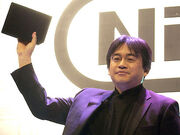"On my business card, I am a corporate president. In my mind, I am a game developer. But in my heart, I am a gamer." - Satoru Iwata in his keynote speech at GDC 2005
Satoru Iwata was the fourth president[1] of Nintendo, succeeding the long-standing previous president of the company, Hiroshi Yamauchi in 2002. He was responsible in great part for defining Nintendo's strategy both before and during the release of its Nintendo GameCube video game console in 2001, a vision which helped Nintendo generate a forty-one percent increase in sales at the end of the 2002 fiscal year.[2]
Barron's Magazine named Iwata one of the world's top CEOs, due mostly to the Wii and Brain Age sales, as well as Nintendo's increased stock price.[3]
Biography[]
Early life[]
Satoru Iwata was born in Sapporo, Japan. He expressed interest in the creation of video games early on, and began producing electronic games at his home during his high school years. The several simple number games Iwata produced made use of an electronic calculator he shared with his schoolmates. Following high school, Iwata was admitted to the prestigious Tokyo Institute of Technology, where he majored in computer science. While attending the school, he did freelance work for HAL Laboratory, Inc., a subsidiary of Nintendo, as a programmer. Satoru Iwata was married until his death in 2015.
Career[]

Satoru Iwata presenting a Wii console prototype at Nintendo's 2005 E3 press conference
After completing college, Iwata joined HAL Laboratory in a full-time capacity. He became the company's coordinator of software production in 1983. Some of the video games he helped create while he worked there were Balloon Fight, Earthbound, and the Kirby games.[4][5] Iwata was eventually promoted to president of HAL in 1993. Nevertheless, both he and HAL sometimes aided in the creation of Nintendo video games.
In 2000, Iwata took a position at Nintendo as the head of its corporate planning division. When Hiroshi Yamauchi, the company's president since 1949, retired on May 31, 2002, Iwata succeeded as Nintendo's fourth president, and the first unrelated to the Yamauchi family through blood or marriage. He continued to help out at HAL as a consultant. It is said that Iwata had worked as an artist there, assisting in creating concept art of Kirby characters for use in the Kirby series of video games. His latest projects were the Wii U and the Nintendo 3DS. He commented on the Wii in his section of Nintendo's Wii website, Iwata Asks. Iwata has also worked on The Legend of Zelda, Mario, and the Animal Crossing series of games. He has also played a cameo in WarioWare: Smooth Moves, where he is referred to as "Shop Manager Iwata".
Illness and Death[]
In June 2014, Nintendo announced that Iwata would not be present at E3 2014 due to medical-related reasons. It was later revealed that he was undergoing surgery to remove a tumor in his bile duct. A little over a year later on July 12, 2015, Nintendo announced that Iwata died the previous day at the age of 55 due to complications from the tumor.[6]
Flags at Nintendo's headquarters were lowered to half-staff. All of Nintendo's regional offices took a day of silence on July 13 across all of its social media accounts in remembrance of Iwata. Nintendo confirmed that until an official replacement is announced, general directors Shigeru Miyamoto and Genyo Takeda would be acting presidents, taking over Iwata's former duties together managing the company in the interim.
Members across the gaming industry and fans alike expressed their sadness on social media over Iwata's passing and gratitude for his accomplishments. Shuhei Yoshida, president of SCE Worldwide Studios, stated: "He has given a great contribution to the development of the gaming industry. I will pray for Iwata's soul". Composer and director Junichi Masuda, most known for his work with the Pokémon games, tweeted: "He was a man who understood Pokémon, and a great leader. When I visited the other day, he was well. I will pray for his soul from the bottom of my heart".
One day after Iwata's death, a rainbow appeared over Nintendo's headquarters in Kyoto and was dubbed "The Rainbow Road to Heaven", a reference to a stage in Mario Kart.
References[]
- ↑ Nintendo, Co. Nintendo Annual Report 2011. N.p., 31 Mar. 2011. Web. 13 Oct. 2011. http://www.nintendo.com/corp/annual_report.jsp.
- ↑ N-Sider: Profile: Satoru Iwata.
- ↑ Andrew Bary. The World's Best CEOs. Barron's Online.
- ↑ Wii.com - Iwata Asks: New Super Mario Bros. Wii. Retrieved on 12 July 2010.
- ↑ Wii.com - Iwata Asks: Special Edition Interview. Retrieved on 12 July 2010.
- ↑ http://au.ign.com/articles/2015/07/13/nintendo-ceo-satoru-iwata-has-passed-away
External links[]
- Seattle Post Intelligence: Satoru Iwata Interview
- Satoru Iwata Kikizo Video Interview
- Gamespy: Nintendo's New Direction - A discussion with Nintendo President Satoru Iwata
- Heart of a Gamer speech at GDC '05
- A+E Interactive E3 2007 Interview
- Level Up E3 2007 Interview (Archived Link)
Legacy and Tributes[]
- Fans Are Campaigning for Balloon Fighter in Smash Bros. as a Tribute to Satoru Iwata
- The Video Game Community Pays Tribute To Satoru Iwata
- 5 Reasons We're Thankful to Satoru Iwata
- Artists Across the Web Pay Tribute to Satoru Iwata
- Some things you might not know about Nintendo's Satoru Iwata
- 10 Iwata Moments

|
This page uses content from Wikipedia. The original article was at Satoru Iwata. The list of authors can be seen in the page history. As with Smashpedia, the text of Wikipedia is available under the GNU Free Documentation License. |
